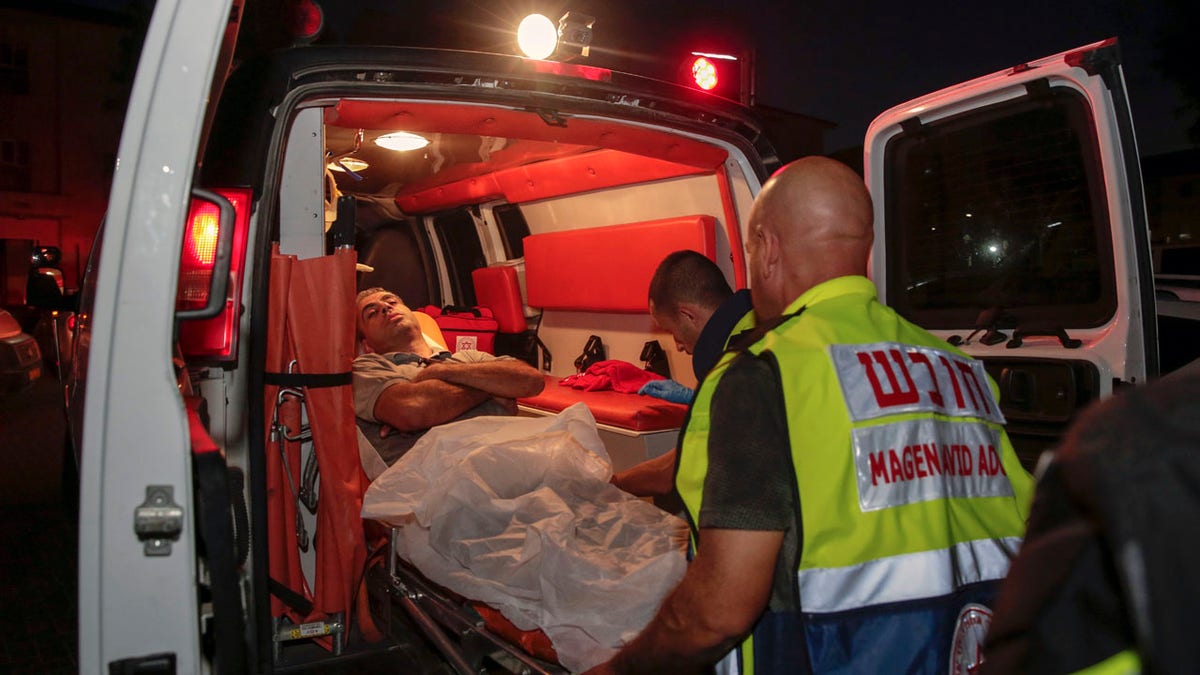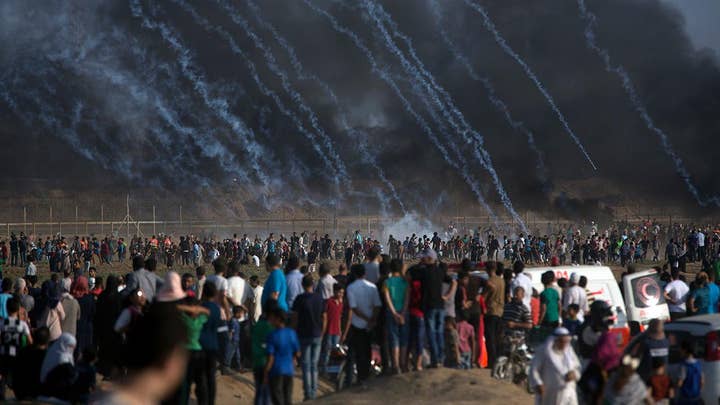
An injured man loaded into an ambulance after rocket fire from the Gaza Strip hit the town of Sderot, Israel, on Wednesday. (AP Photo/Yehuda Peretz)
Israeli jets struck a dozen targets in the Gaza Strip Wednesday night as more than 70 rockets were launched toward the Jewish state from the Hamas-controlled region.
The Jerusalem Post, citing the Israel Defense Forces, reported that more than 70 rockets were launched from Gaza Wednesday evening. The IDF said many of the rockets fell into open territory, and the Iron Dome defense system intercepted 21 of them. However, it also said 15 Israelis were injured and many families were forced to spend the night in shelters.
Israeli media reported that at least six people were injured by shrapnel in the border town of Sderot. The Jerusalem Post also reported that a rocket landed directly on a house in the Hof Ashkelon Regional Council.
In a statement, Hamas celebrated the rocket attacks, saying that it was "delivering on our promise. The resistance accepted the responsibility to even the playing field with the enemy and it is succeeding in doing so."
The IDF said the 12 Hamas sites hit by its jets included "an offensive maritime terror tunnel ... several terror sites in military compounds throughout the Gaza Strip ... rocket manufacturing facilities and a central logistical military complex."
The exchange came amid continued attempts by Egypt to broker a broad cease-fire deal between Israel and Hamas.

A security officer standing near the site of a rocket strike in Sderot, Israel, on Wednesday. (Copyright 2018 The Associated Press. All rights reserved.)
Earlier Wednesday, the IDF said shots were fired from Gaza at civilians working on the barrier that separates the territory and Israel, damaging a vehicle. Israel said it struck a Hamas post in retaliation. No casualties were reported.
On Tuesday, Israel struck a Hamas military post in Gaza, saying it was in response to militant fire at Israeli troops. Hamas said two of its fighters were killed. It also disputed Israel's account, saying shots were fired as part of a graduation ceremony for a group of fighters inside the camp.
Also Wednesday, a United Nations aid agency called on Israel to allow emergency fuel into the Gaza Strip to avert the shutdown of hospitals and sanitation facilities.
Jamie McGoldrick, the U.N. humanitarian coordinator for the Palestinian territories, in a news release called Israel's restriction of fuel imports "a dangerous practice, with grave consequences on the rights of people in Gaza."
Israel halted the supply of petroleum and natural gas to Gaza last week in response to incendiary kites and balloons launched from Gaza into southern Israel. Israel temporarily suspended fuel shipments to Gaza in July for similar reasons.
Israel has been battling large fires caused by kites and balloons rigged with incendiary devices or burning rags launched from Gaza that have destroyed forests, burned crops and killed wildlife and livestock.
The almost daily airborne arson attacks have been part of months of weekly border protests led by Hamas aimed in part at drawing attention to the Israeli-Egyptian blockade imposed after it took control of the territory in 2007.
The demonstrations have been fueled in large part by pervasive despair caused by the blockade that has caused widespread economic hardship and left the coastal territory with crippling fuel shortages and just a few hours of electricity a day.
Over the past four months, 158 Palestinians have been killed by Israeli fire, including at least 120 in the protests near the fence and others in Israeli air strikes and other incidents elsewhere in Gaza, according to the Gaza Health Ministry and a local rights group. Twenty-four of the slain protesters were minors, the ministry has claimed. One Israeli soldier was killed by a Gaza sniper during this period.
Israel said it's been defending its border and nearby communities and accused Hamas of using the protests as cover for attempts to breach the fence and carry out attacks.
Mahmoud Daher, of the World Health Organization in Gaza, said in a telephone interview, "The situation is very serious." He said by the end of the month, all fuel supplied by the U.N. will run out "and the problem is there is no sign of renewed funding from donors in the horizon."
The Associated Press contributed to this report.

